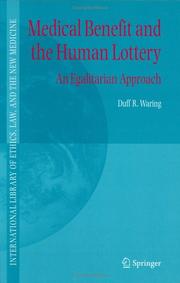| Listing 1 - 2 of 2 |
Sort by
|
Book
ISBN: 9782760634879 2760634876 Year: 2016 Publisher: Montréal : Les Presses de l'Université de Montréal,
Abstract | Keywords | Export | Availability | Bookmark
 Loading...
Loading...Choose an application
- Reference Manager
- EndNote
- RefWorks (Direct export to RefWorks)
Quatrième de couverture : "Dans ce livre, des chercheurs, des administrateurs, des décideurs et des professionnels de la santé se penchent sur les problèmes de justice distributive engendrés par le manque de ressources dans le système de santé au Québec. Listes d’attente, pénurie de personnel et coûts élevés des médicaments menacent l’équité du système et l’égalité d’accès aux soins. De grands enjeux se dessinent, dont le plus important consiste à assurer l’équilibre entre les besoins de la population, les moyens et les techniques accessibles pour y répondre et les objectifs sociaux. Devant la nécessité d’une réforme en profondeur du système public et pour en assurer la pérennité et l’efficacité, les auteurs dressent l’état des lieux et proposent des pistes de solution. Ayant pour but de favoriser l’interdisciplinarité, ce livre est une contribution importante aux débats en cours et deviendra une référence pour tous ceux qui, individus et groupes, cherchent à améliorer la situation."
Health Services Accessibility --- Health Care Reform --- Health Care Economics and Organizations --- Ethics, Institutional --- Health Care Rationing --- ethics --- Health Care Reform. --- Ethics, Medical. --- Social Medicine. --- Health services accessibility --- Health care reform --- Medical ethics --- Social medicine --- Services de santé --- Ethique médicale --- Médecine sociale --- ethics. --- Moral and ethical aspects --- Accessibilité --- Aspect moral --- Réforme --- Quebec. --- Services de santé --- Ethique médicale --- Médecine sociale --- Accessibilité --- Réforme --- Health Care Rationing - ethics

ISBN: 1402029705 140202973X 9781402029707 9781402029738 Year: 2004 Volume: 22 Publisher: Dordrecht Spinger
Abstract | Keywords | Export | Availability | Bookmark
 Loading...
Loading...Choose an application
- Reference Manager
- EndNote
- RefWorks (Direct export to RefWorks)
Bioethicists, moral philosophers and social policy analysts have long debated about how we should decide who shall be saved with scarce, lifesaving resources when not all can be saved. It is often claimed that it is fairer to save younger persons and that age is an ethically relevant consideration in such tragic decisions. Medical benefit should be maximized and final selection should aim to minimize the contaminating influence of chance. These claims are challenged by Duff R. Waring in Medical Benefit and the Human Lottery, one of the few books that attempts a sustained defence of random patient selection. This book combines ethics and political philosophy in its novel and strict egalitarian approach to patient selection for transplantable organs. Waring addresses the question of whether we should choose between lives on the basis of fair chances or best outcomes. He argues that final selection criteria should be based on fair chances that equalize opportunity as opposed to best outcomes. His defence of "hardy" egalitarianism aims to show that random selection by lottery can affirm both a common humanity and the equal value of lives. In so doing, Waring argues that we give the principle of equal concern and respect a radical expression: above a noncomparative threshold of medical benefit, each candidate can have an equal claim to life. The notion of patient selection by lottery has not fared well in bioethics and has been regarded by some as a moral affront. Waring argues that a human selection lottery may be neither as crude nor as ethically anomalous as some have supposed. Indeed, it can reflect a familiar conception of equality as a political and moral ideal. This conception abstracts from many undeniable differences between patients and claims that scarce resources should be allocated on the principled assumption that each of their lives is equally worth saving. The book is also notable for its critiques of some recent utilitarian notions of medical benefit which can have an age-biased impact on elderly patients. Waring then argues against the leading, contemporary age-based approaches to patient selection.He explores the way random selection by lottery can affirm his egalitarian ethos in cases where eligible transplant candidates have each passed a threshold level of prospective medical benefit that has been set by democratic deliberation. Taming chance with a human lottery is defended as the most lucid means of ensuring equal opportunity.
Health Care Rationing --- Patient Selection --- Age Factors --- Organ Transplantation --- Medical ethics --- Transplantation of organs, tissues, etc. --- ethics --- Moral and ethical aspects --- Transplantation of organs, tissues, etc --- Biomedical ethics --- Clinical ethics --- Ethics, Medical --- Health care ethics --- Medical care --- Medicine --- Moral and religious aspects --- Bioethics --- Professional ethics --- Nursing ethics --- Social medicine --- Philosophy. --- Ethics. --- Medicine—Philosophy. --- Political philosophy. --- Philosophy, general. --- Philosophy of Medicine. --- Political Philosophy. --- Political philosophy --- Deontology --- Ethics, Primitive --- Ethology --- Moral philosophy --- Morality --- Morals --- Philosophy, Moral --- Science, Moral --- Philosophy --- Values --- Mental philosophy --- Humanities --- Medical ethics. --- Moral and ethical aspects. --- Health Care Rationing - ethics --- Patient Selection - ethics --- Organ Transplantation - ethics --- Transplantation of organs, tissues, etc. - Moral and ethical aspects
| Listing 1 - 2 of 2 |
Sort by
|

 Search
Search Feedback
Feedback About
About Help
Help News
News